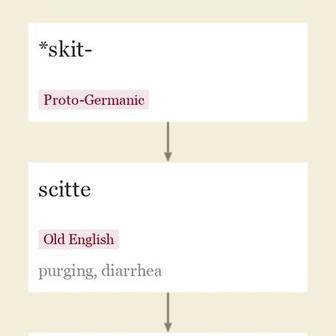shitty adj.
1924, "
Entries linking to shitty

Middle English shit "
Shit-faced "
Up shit creek "
The expression when the shit hits the fan "
The expression is related to, and may well derive from, an old joke. A man in a crowded bar needed to defecate but couldn't find a bathroom, so he went upstairs and used a hole in the floor. Returning, he found everyone had gone except the bartender, who was cowering behind the bar. When the man asked what had happened, the bartender replied, 'Where were you when the shit hit the fan?' [Hugh Rawson, "Wicked Words," 1989]
adjective suffix, "
"
updated on August 24, 2022